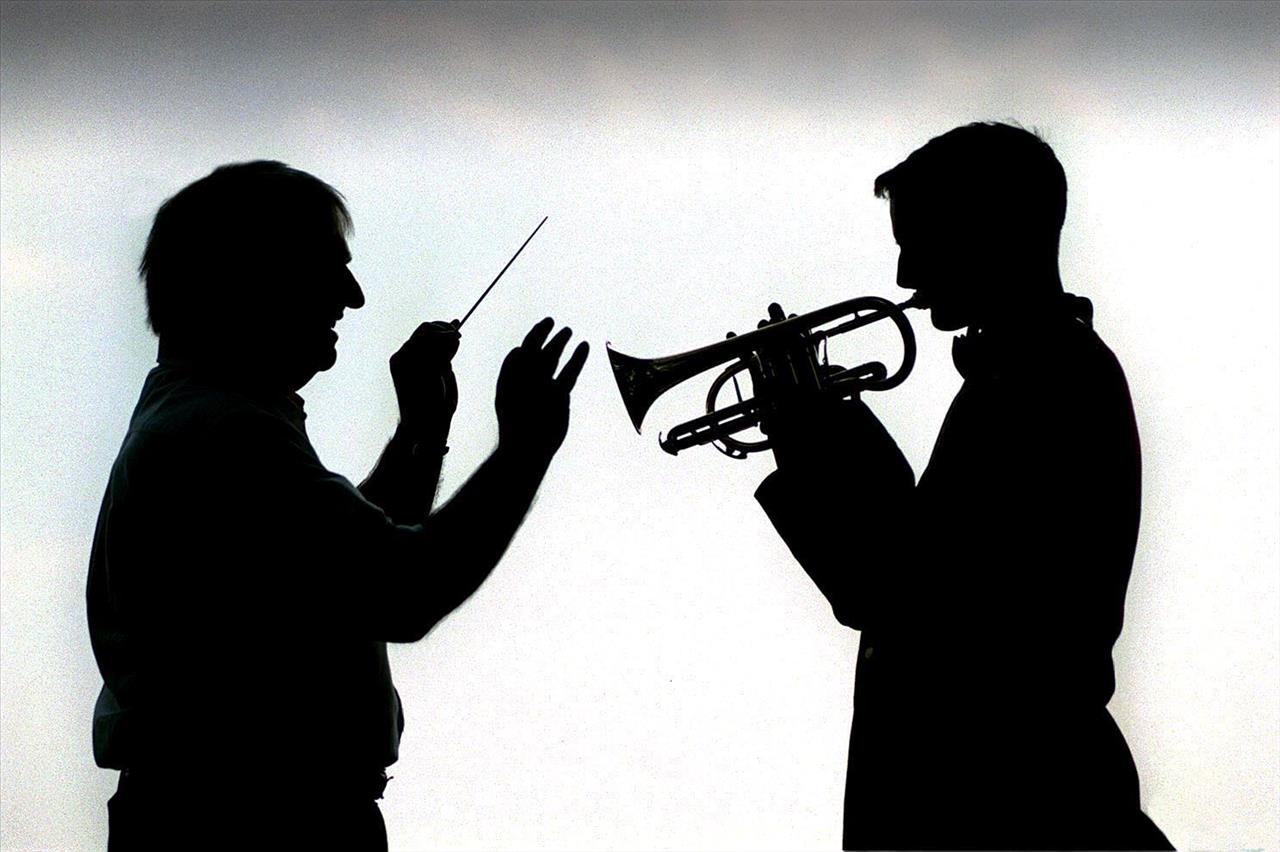
In a series of articles written for 4BR, Director of Mode for… writer, musician and mental health first aid instructor and advocate Tabby Kerwin looks at the importance of gaining awareness and education about mental health within the brass band movement.
Tabby will focuses on how band members, conductors and adjudicators can all help to break the stigma and create stronger supports and more resilience for better mental health for all.
Part 2: Mental Health in Brass Bands… Conductors
Following on from the first article for 4BR which looked at creating more awareness and support of mental health in the bandroom, in Part 2 I take a look at the people directing our brass bands - conductors… the glue that can hold a band together or the fire that melts the hearts of musicians.
Fair?
I guess that’s a matter of personal experience or opinion. All I can say is that I’ve worked under a variety of conductors whose approaches have had mixed results on not only the progress of the band, but also the mental health of the musicians.
In May 2019 I created a survey into the direct effect that being in a brass band can have on mental health (http://modeforpublishing.com/mental-health).
My research stemmed from a 2016 survey commissioned by Help Musicians UK, the leading independent charity for musicians in the UK.

Mental health issues
As part of its MAD (Music and Depression) campaign, in 2016 the charity commissioned Sally Anne Gross and Dr. George Musgrave (MusicTank / University of Westminster) to conduct a study into mental health issues faced by musicians and the wider music industry.
However, whilst this covered a wide demographic of 2211 musicians it did not specifically include the medium of brass bands.
The intention of my survey was to find out if musicians specifically in the brass band movement suffered the same mental health issues as those in the wider music industry, and to see if the statistics correlated.
If they did, it would emphasise the need to implement information, support and mental health provisions into the brass band movement.
They did.
The intention of my survey was to find out if musicians specifically in the brass band movement suffered the same mental health issues as those in the wider music industry, and to see if the statistics correlated.
Postive effects
It has been proven that the simple act of playing music and being with friends in a communal musical group such as a brass band can be a massive boost to wellbeing. Indeed, for many experiencing mental ill health, it can have many positive effects to aid recovery.
However, there is a demographic of our brass band population who have experienced mental ill health directly due to brass bands; from performance anxiety, stress, bullying or organisational pressures.
Some people may be more susceptible due to other personal, professional and socio-economic factors, but it was found that many attributed their mental health issues directly to brass bands. As a consequence many have left the banding movement.
However, there is a demographic of our brass band population who have experienced mental ill health directly due to brass bands; from performance anxiety, stress, bullying or organisational pressures.
As well as creating better support and resilience within brass bands for people experiencing mental ill health, it is also important we do everything we can to eradicate the issues that cause them. That in turn could help our movement retain more players.
The key is awareness and education.

Directly linked
Aside from the normal expectations of nerves and performance anxiety, there were many comments published in the 2019 survey that alluded to mental ill issues directly linked to the behaviour of conductors.
A conductor is engaged to develop a band musically, as well as act as a link from a composer to an audience, via the performance of their players. It comes from a desire to both educate and to learn.
A conductor is also engaged to manage a group of people; an ensemble full of individuals from different backgrounds who require different methods of encouragement and development but who require to be moulded into one ensemble.
In that respect I quite like the Wikipedia definition of a conductor: “...the primary responsibilities of the conductor are to unify performers…”
In that respect I quite like the Wikipedia definition of a conductor: “...the primary responsibilities of the conductor are to unify performers…”
No one size fits all
Yes! Unify your musicians. There is no ‘one size fits all’ approach. Musical knowledge aside, it requires a level of management expertise to get the best from individuals to bring them together. That can mean 28 or more different approaches are required.
However musically ambitious a conductor is, it should never come at the detriment of the mental health of the musicians.
Quite honestly, this is where some conductors fall foul and would be well advised to understand the need for empathy, compassion and understanding of mental health in order to develop their own management techniques.
This is a form of duty of care - one that is mindful of a musician’s mental health.

Copyright: Lorne Campbell
Continuum
In my first article I spoke about mental health being on a continuum. When you stand in front of a band as a conductor, you have no idea where everyone is on their personal continuum at the time of the rehearsal, contest or concert.
Equally, the band members do not know where you are on the spectrum either, so being mindful of your own mental health and that of your conductor is also vital.
What does this mean?
Well, whilst a more aggressive approach to direction might seem appropriate to some, in reality, bullying and aggression in a management role does never gets the best out of people.
Responsibility
Am I saying that everything a conductor says and does should be all ‘nicey nicey’? No, not at all.
We all have a responsibility to build our own personal resilience so as not to be too easily hurt and offended by the words and actions of others.
This is the fine line conductors need to tread; the need to be effective managers delivering the best possible results whilst being mindful of the mental health and wellbeing of the musicians they work with.
Discipline and control comes from respect.
This is the fine line conductors need to tread; the need to be effective managers delivering the best possible results whilst being mindful of the mental health and wellbeing of the musicians they work with.
How?

Reciprocal duty of care
By educating themselves and continually developing the skills required to be a conductor; By caring, being passionate and empathetic; By being kind and by monitoring their own use of language and actions; By being aware of themselves, the people and situations around them.
In the same way bands have a reciprocal duty of care to the conductors and their mental health too.
Within the brass band movement, we are fortunate to have some incredibly talented, professional and caring conductors working at all levels; conductors who genuinely care about the musical development of their band but also for all the players who contribute to it.
The respect they show their band must also be reciprocated in return – be it decisions made or, options considered.
Within the brass band movement, we are fortunate to have some incredibly talented, professional and caring conductors working at all levels; conductors who genuinely care about the musical development of their band but also for all the players who contribute to it.
Many conductors are freelance professionals, relying on the work as part of their income. Making decisions that affect that can therefore be significant.
Relinquishing the services of a good and caring conductor via a faceless email or a phone call one hour before the start of rehearsal is not only bad practice; it could be the trigger for mental ill health issues – ones exacerbated by the stress at a sudden loss of income and effects on family.
Awareness
As a brass band movement we therefore have a duty of care to each other; to players, conductors, supporters, critics and judges.
With awareness and education we could all be a little better at undertaking the roles and executing the decisions that need to be made.
So, next time you’re stood in front of a band or the next time your band makes a decision regarding a conductor, think of the personal outcome.
Consider the person, not just the role they play and choose the correct action and language to deliver direction and decisions with the respect and kindness people command.
Tabby Kerwin
Editor’s Notes
Tabby Kerwin is a trained Mental Health First Aid (MHFA) instructor and also runs a series of mental health awareness workshops for bands, conductors and adjudicators.
Tabby’s book ‘The Three Ps: Possibility, Productivity & Performance’ is available from the Mode for… website or on Amazon.
Her new book ‘The Three Taboos: Cancer, Grief & Mental Health’ will be published in 2020.
Brass on The Mind Facebook Group at http://www.facebook.com/groups/brassonthemind
Mode for… - http://www.modefor.co.uk
The new CD ‘Lago – The Music of Simon Kerwin’ can be purchased at http://www.modeforpublishing.com with a donation from sales going to Bexley Wing, Leeds Cancer Centre, St. James’ Hospital. Also available on iTunes, Apple Music and Amazon Music.













